Items
Subject is exactly
Government Federal
-
2020-07-01
The hidden costs of the pandemic
Covid-19 was a surprising event that has shaken how many view the world. I am here now retelling my story on behalf of HNSC 2100, Fall 2020, M. Horlyck-Romanovsky. The pandemic has brought the worst in many. People were selfish, people took advantage of those who were desperate, and there were countless fights for small things in stores when it wasn't a big necessity. It brought me to think that humanity is really that selfish. But in a turn of things, it also brought together many people. Those who cared for one another were always there to talk to, sharing what they could and giving helpful advice to handle this pandemic. This leads me to my family and friends. When it first began, I was scared and felt all alone. My friends were the first ones I'd contact and first hear from. Worry washed over me when I realized there were certain friends I rarely talked to, making me want to go through who I had contact with and those I didn't. Time felt short and precious as you see many people's lives ending too soon because of this virus. In a sense, it made me value life more. While this opened my eyes to one side of life, it also opened my views to another part of life. When there is a more significant issue, those in power still refuse to do what is for the greater good, but instead for profits. What could have been a perfect time to provide resources and funds to marginalized and those in poverty communities they desperately need to prepare for a foreseeable shutdown? Instead, nothing was done for a while, and jobs were taken away to keep everyone at home. There was money to use, especially in bigger businesses and the Government, but it needed to be seen as profitable. What was worse about this was that I actually worried that the Government wouldn't have money in general, but looking into how more prominent corporations asked for millions, if not billions, in compensation for lost revenue, which they did receive in the end, made me extremely upset at the priorities of where our society is. Not only first losing faith in humanity but also in our own governmental structures. I wanted to grow up to work at these more prominent corporations due to their fame and how they represent themselves. But seeing this and the lack of giving back for the greater good, I have lost interest in even being associated with these types of corporations. One big thing that did come from all this chaos was the need to advocate for the smaller groups of people who can't or are afraid to speak up. I now want to work in a place where we can easily provide feedback/assistance to communities that are being impacted but not cared for. I take inspiration from my friends who have been there by my side, taking time when they could and always showing their support. Without them, I couldn't have gone through the pandemic with my sanity intact. While on the topic of sanity, the ways that the cost of living and prices of food went up at such a dire time of need were the most insane part of this pandemic. No one can afford food; it is clear no one is willing to spend on higher quality foods, and it's going to waste, so in turn, the prices would go down, right? No. The entire industry would rather destroy their own crops than give them away at dirt-cheap prices when it would have benefited everyone. Getting rid of the excess waste while making some money for selling it cheaply and the people can actually eat healthily as the prices plummet due to an abundance of this resource. Being a good defense against the virus if your immune system is at its peak! It infuriates me that this did not occur. My family struggled to make ends meet and put food on the table. It was the first time I had to reach out to food pantries, and I saw such long lines. It was a saddening sight to see. Every day, week, month, you'd see a line. Just how many really needed help, but no one could provide it. And when help did arrive, it was a measly couple hundred dollars or close to a thousand after half a year of suffering. If only food prices would have gone down as the entire world was going down, too, that would have been a blessing in itself. Even today, it is hard not to find myself using a food pantry. I wish I wasn't and didn't require these services, but it has become a regular occurrence ever since the pandemic. Now that it has quieted down while still occurring around the states and the world, the virus has taught us one thing. We must be ready to fend for ourselves; it is a sad truth, but it has become an untrustable and helpful place for the Government. I hoped we could move toward a better future, but this wasn't true. But that is what I took from this, and I plan to do work to combat and help others. The one good thing I see that came from this is my experience. -
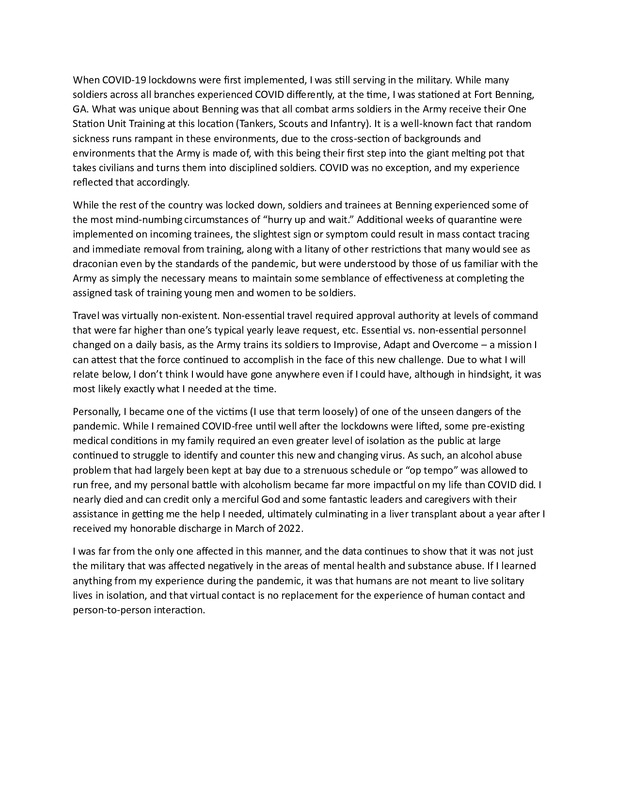 2020-03-31
2020-03-31Locked down, Locked in
I was a SSG in the US Army when the lockdown hit. The isolation let my personal demons almost get the best of me, but lessons were certainly learned and I pray we never get to that point ever again. -
 2023-08-30
2023-08-30COVID paranoia alive and well in 2023
At a stop light this morning, my attention was grabbed by a car with lots of writing on it. I wish I could have gotten a picture, but the light turned green before I could. The car message was about Marxism and how fear controls its movement. The message expressed that recent events have all been staged in order to control society and went on to predict that mask mandates would be back on September 15. The message ended by encouraging people to resist the future mandate in order to retain control of our society. I was very intrigued to see that there are some people who are still very vocal about topics such as this and very loudly are telling people not to live in fear when they are the only ones who seem to be living in fear these days. I read a hashtag on their car and looked it up when I got home. This page belongs to a person (or movement) that is very anti-mask, anti-covid vaccine, and anti-mandates. They are part of the extreme right politically and very religious. I’m curious to see if anything were to happen on the 15th and if not, how this page will respond to the “normality” of September 15. I guess we’ll see in two weeks. -
2023-07-21
A Year of Betrayal
This doesn't need to be long I am just glad to have a way to express how incredibly disappointed I have been throughout the course of this pandemic. In the first few months after the outbreak, most of us relied heavily on the public governmental briefings by Dr Fauci and others, and we eagerly awaited the development of tests and vaccines by the pharmaceutical industry. We trusted that our government and our doctors were working earnestly to provide good solutions to a terrible problem, quickly. But if we fast forward a few years, what a horrible change has transpired! Pretty much everyone who we trusted at the beginning of the pandemic has been proven either a downright liar or to have been working for their own private interests all along. Dr Fauci couldn't get his story straight - repeatedly - over simple matters, and lied again and again about the connection between the virus, the government, and the Wuhan virology lab. Though various remedies (like ivermectin) were decried as malicious and dangerous, we now know that the pharmaceutical companies we were busy trusting were pushing to consider the use of ivermectin medical malpractice, because they wanted an emergency use authorization for their insufficiently tested and experimental vaccines. Some of us already knew we couldn't trust our government, but most of us hoped that we could at least trust our doctors. What a disappointment. -
 2023-05-16
2023-05-16News Article Analysis: India Is What Happens When Rich People Do Nothing
I will analyze this article focusing on the devastating impacts of the Covid-19 pandemic, including exploitation of marginalized groups like migrant workers, oxygen and other medical resource shortages, and the overall structural consequences of poor governance and health infrastructures in India. Not only does the writer Krishnan cater to the failures of the current Indian federal government during the pandemic, but he aims to point out the great moral failure of our whole generation, which has exposed the long-existing structural issues in providing for public healthcare and social security of Indian citizens. -
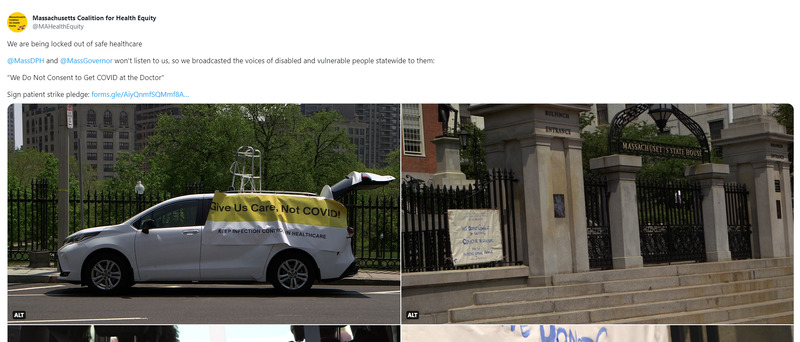 2023-05-14
2023-05-14Pandemics are Not "Great Equalizers" - Comparing COVID-19 to the Bubonic Plague Outbreak of 1870-1905
With the designation of COVID-19 as a "public health emergency" by the Centers for Disease Control and Prevention (CDC) ending as of May 11, 2023, public healthcare facilities throughout the US are rolling back protections they once employed to try to keep people safer during this ongoing pandemic. So, as this unit asks of us students, are pandemics the “great equalizers” in terms of social inequalities, and is there more equality now that the "emergency" has been deemed to be over? I argue that this is not the case, as immune compromised and disabled people have been more or less left for dead. A huge swath of healthcare facilities have removed mask mandates for care providers and hospital visitors, which leaves vulnerable and immune compromised people at a much higher risk of getting COVID-19 while receiving the medical care that is necessary for them to manage their conditions. In response, people and organizations, such as the Massachusetts Coalition for Health Equity in the tweet above, have begun to mobilize in favor of maintaining COVID-19 protections in healthcare settings by organizing strikes, protests, petitions, and phone banks to public officials. The reasons for maintaining COVID precuations such as mask mandates, access to COVID tests, and enhanced filtration in healthcare settings are clear. As the Massachusetts Coalition for Health Equity describes in their petition titled "Patient Strike Authorization Vote," the CDC "advises immunocompromised people to avoid crowded indoor settings, which now includes all healthcare institutions without universal masking," essentially maintaining that COVID is dangerous to immune compromised people while giving them no option but to risk exposure if they want to receive their necessary healthcare (Patient Strike Authorization Vote). The petition text explains that "[n]ational leaders in hospital epidemiology argue that universal masking should become the new standard of care, as gloves became with HIV" in order to keep people with compromised immune systems such as young children and elders safe (Patient Strike Authorization Vote). Currently, disabled and immune compromised people "are being locked out of safe healthcare" and are facing discrimination that makes them unwelcome and unsafe in healthcare settings (Massachusetts Coalition for Health Equity). In order to relate this modern COVID-19 pandemic to our course materials and demonstrate that discriminatory treatment during times of disease is not new, I will compare the above post to points from the text "The Chinese as Medical Scapegoats In San Francisco, 1870-1905" by Joan B. Trauner. This text discusses the discrimination against Chinese and other East Asian people living in San Francisco's Chinatown during a bubonic plague outbreak in the late nineteenth century. Sinophobic and anti-Asian sentiments, similar to those that arose during the epidemic Trauner details, have also been evident throughout the COVID-19 pandemic, so much so that even US President Donald Trump referred to COVID-19 as the "China virus." Ableism has also been prevalent throughout the COVID pandemic, as many people no longer care about the effects of the virus, because it harms disabled and immune compromised people most, especially people who also face racial discrimination in healthcare. Trauner explains that, because white people in the US believed the plague primarily affected Chinese and other Asian people, and because plagues were bad for business,"[t]he governor of California, Henry T. Gage, and executives of big business and of the large railroads, in conjunction with the San Francisco Board of Trade, the San Francisco Chamber of Commerce, and the Merchants Association, were all determined to prove that the plague did not exist in San Francisco" (78). The author of the Patient Strike Authorization Vote argues that today, we see a similar pro-business sentiment that comes at the expense of immune compromised people who are more likely to get sick with and die from COVID-19, writing: "Hospitals that remove masks and surveillance testing are making a value judgement about our lives, because they want to preserve their profit margins" (Patient Strike Authorization Vote). The CDC's ending of the COVID-19 public health emergency designation and the resulting halt of COVID mitigation procedures indicate that people are ignoring the needs of immune compromised people so that everyone can feel more comfortable going "back to normal" and maintaining consumption habits that are desired by businesses. Additionally, in both the past plague outbreak and the current pandemic, public health officials have shown hesitancy to give people vital information, which has led to harm. As Trauner explains, during the bubonic plague epidemic, "San Francisco Mayor Eugene Schmitz refused to approve the printing of health reports and vital statistics and even attempted to remove from office four members of the Board of Health who persisted in stating that plague existed in San Francisco" (79). Today, because the public health emergency designation ended on May 11th, 2023, the CDC is "no longer reporting aggregate cases and deaths, COVID-19 Community Levels, COVID-19 Community Transmission Levels, or COVID-19 Electronic Laboratory Reporting (CELR) data," all of which have been used to determine the severity of the situation throughout the pandemic (COVID Data Tracker). Meanwhile, over one thousand people are dying of COVID every single week, but COVID transmission levels are not being tracked, so people cannot know how many COVID positive cases there are in their county and how likely they are to contract the virus by going out in public (COVID Data Tracker). Another similarity between the COVID-19 pandemic and the bubonic plague outbreak of the late nineteenth century lies in the responses of the people facing discriminatory treatment in public health settings during these respective disease outbreaks. Trauner writes that before, during, and after the bubonic plague outbreak, Chinese businesses and health practitioners constructed and operated their own hospitals that would treat the people of Chinatown, because they were not welcome at other hospitals due to racial discrimination (81). Trauner explains that "[e]arly Chinese immigrants realized the necessity of banding together and providing for their own health care needs," in light of the government abandoning their health needs (81). Activists and organizations like the Massachusetts Coalition for Health Equity are currently banding together and fighting to get better and safer care for immune compromised people during the COVID-19 outbreak, as they are also facing discrimination at hospitals rolling back COVID precautions, because these spaces are not safe for them. The organizing they are doing to try to make healthcare settings safer for immune compromised people looks different, as no one is proposing the creation of immunocompromised-specific hospitals. They are fighting for better treatment, still, using slogans like "We Do Not Consent to Get COVID at the Doctor," and urging people that "[w]e must take collective action to prevent this mass violation of our human rights and federal rights to safe care," as stipulated under the Americans with Disabilities Act (Massachusetts Coalition for Health Equity). In both disease outbreaks, it has been the duty of those being discriminated against to take care of and advocate for themselves. So, in fact, pandemics are not "great equalizers"; in reality, they not only make pre-existing inequities even more visible, but exacerbate them even further. As Trauner argues, "Health policy [...] manifests not only the state of the medical sciences, but the expectations and the value system of society-at-large," and as such, if society-at-large is racist and ableist, then the health policies put into place will reflect these discriminatory values (70). These governmental measures come at a cost to everyone, and especially those facing racist and ableist discrimination. Had the nineteenth-century bubonic plague outbreak been determined an emergency and treated as a serious threat in spite of sinophobic and anti-Asian sentiments, perhaps more research could have been carried out sooner, and more lives could have been saved. If people in the US continue to take the COVID-19 pandemic seriously and not dismiss the pleas of immune compromised and disabled people to continue precautions, perhaps loss of life and further disablement from COVID infection can be mitigated. -
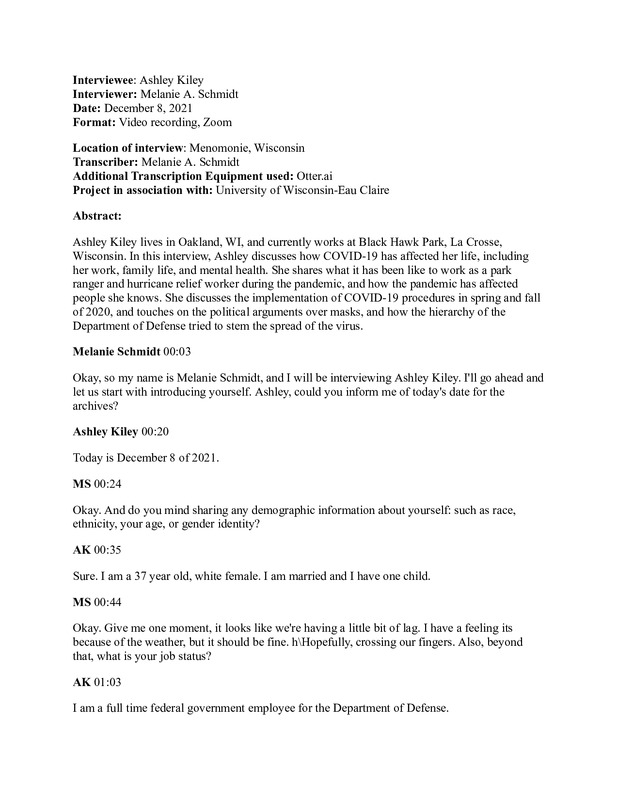 12/08/2021
12/08/2021Ashley Kiley Oral History, 2021/12/08
Ashley Kiley lives in Oakland, WI, and currently works at Black Hawk Park, La Crosse, Wisconsin. In this interview, Ashley discusses how COVID-19 has affected her life, including her work, family life, and mental health. She shares what it has been like to work as a park ranger and hurricane relief worker during the pandemic, and how the pandemic has affected people she knows. She discusses the implementation of COVID-19 procedures in spring and fall of 2020, and touches on the political arguments over masks, and how the hierarchy of the Department of Defense tried to stem the spread of the virus. -
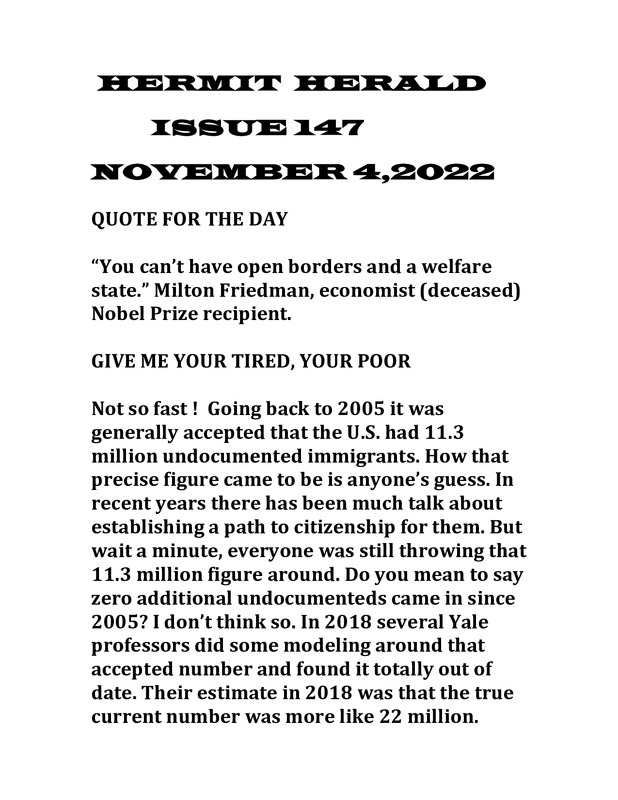 2022-11-04
2022-11-04hermit HERALD, ISSUE 147
Welfare state can't have open borders -
 2022-10-23
2022-10-23HERMIT HERALD, ISSUE 146
DEMOCRACY AT RISK -
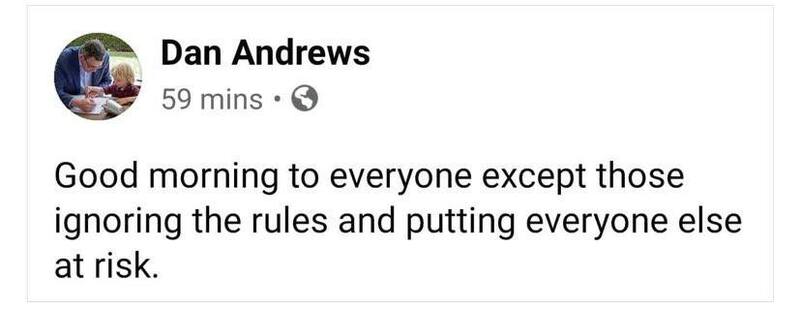 2020-04-04
2020-04-04HIST30060: Daniel Andrews' Facebook Post
This is a screenshot of a Facebook post made by Daniel Andrews’ public page on 4th April 2020. This post exemplifies the Victorian Premier’s ability to co-opt social media trends in promoting his own political agenda. Popular in early 2020, the meme followed the template of “Good morning to everyone except,” followed by exclusion of a relatively a niche social group. This screenshot illustrates the subtle use of social media as propaganda by the Andrews government. Andrews’ social media pages are seldom thought of as such, as the skill of his social media team has allowed him to maintain a popular and likeable social media persona. In an age of ubiquitous social media use, the Andrews government has used social media very effectively to protect its legitimacy and justify its methods. For example, the screenshot highlights the use of guilt by the Andrews government to legitimise health restrictions. The government consistently stressed that the pandemic restrictions were for the benefit of the public and necessitated complete compliance. Those who rejected health advice were endangering the entire community and “putting everyone at risk.” This post therein encapsulates sophisticated government propaganda and the co-opting of social media for political purposes. I selected this post as someone influenced by the sophisticated campaign of government messaging. It lead me to resent rule-breakers and see the prolonged restrictions as a legitimate use of government authority to protect the public. As someone who entered the pandemic as a supporter of the Labor Party and Daniel Andrews personally, I no longer think the severity and length of the lockdowns were necessary. Yet, his social media presence certainly made him likeable, funny, and relatable at the time. -
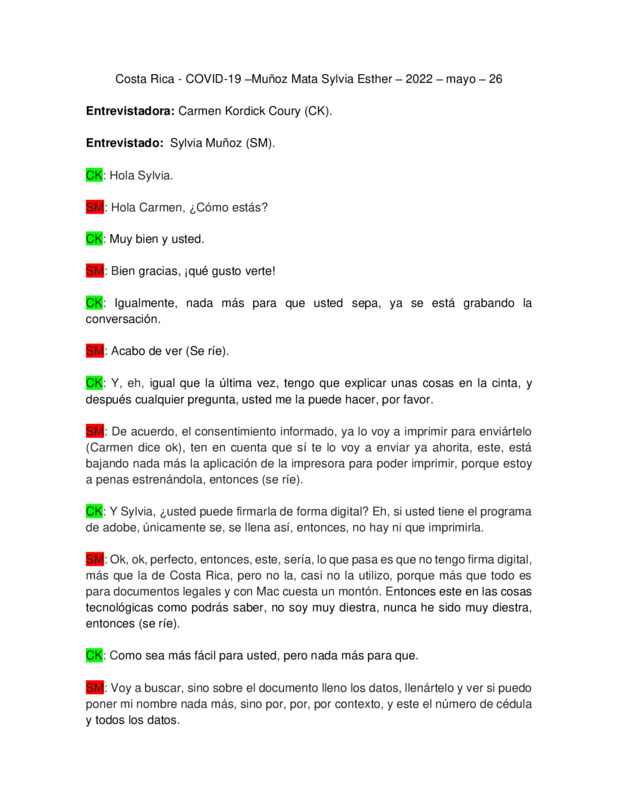 05/26/2022
05/26/2022Silvia Muñoz Mata Oral History, 2022/05/26
En esta entrevista Silvia Muñoz Mata es entrevistada por Carmen Kordick Coury concerniente al covid-19 en Costa Rica. Para empezar, Silvia habla de las cosas que habían cambiado desde el año anterior. Habla de su hogar y como se sintió cuando se enfermó. De la vacuna, teorías conspirativas, y del gene antivacunas incluyendo su novio. De allí, Silvia habla de su trabajo, de la salud mental, el abuso y violencia doméstica. Hablan de cuestiones sociales y el tema de la economía, gente sin trabajo y inflación. Pasan el tema de la inflación, la política, las elecciones y los candidatos. También hablan del gobierno, pensiones de lujo, hospitales y salud y el uso de las mascarillas. Para terminar, hablan de las fuentes principales de información y del futuro. -
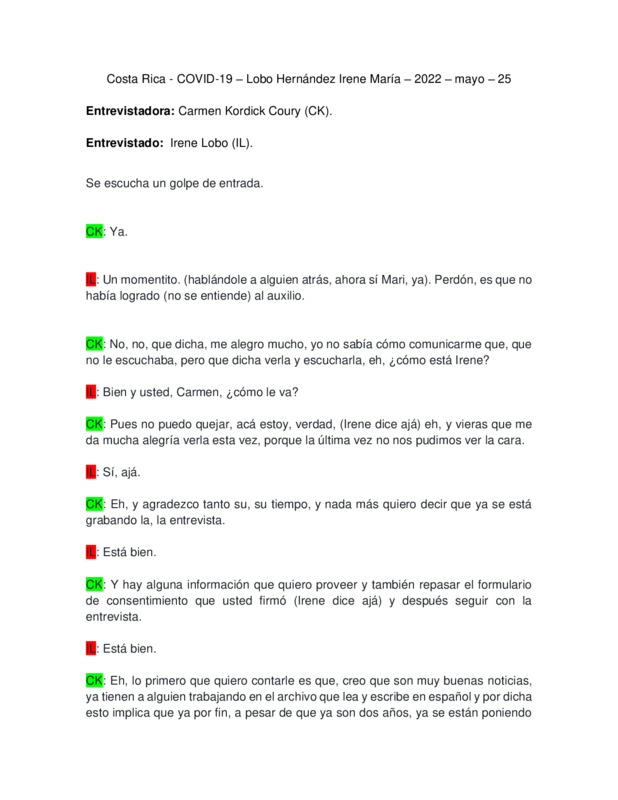 05/25/2022
05/25/2022Irene Lobo Hernández Oral History, 2022/05/25
En esta entrevista Irene Lobo Hernández es entrevistada por Carmen Kordick Coury concerniente al covid-19 en Costa Rica. Para empezar, hablan de lo que ha cambiado desde el ano anterior. Habla de su trabajo de abogada, del desempleo y la economía. Irene también habla del gobierno, de las vacunas y de gente que no confía en las vacunas. Habla de las elecciones y los candidatos. De gente conocida que se han enfermaron y unos que han fallecido por la pandemia. Irene también habla de las formas de celebrar la vida de su hermana que falleció el año anterior, habla de su familia y el uso de las mascarillas. Para terminar, habla de sus fuentes principales de información, la información falsa y sus deseos para el futuro. -
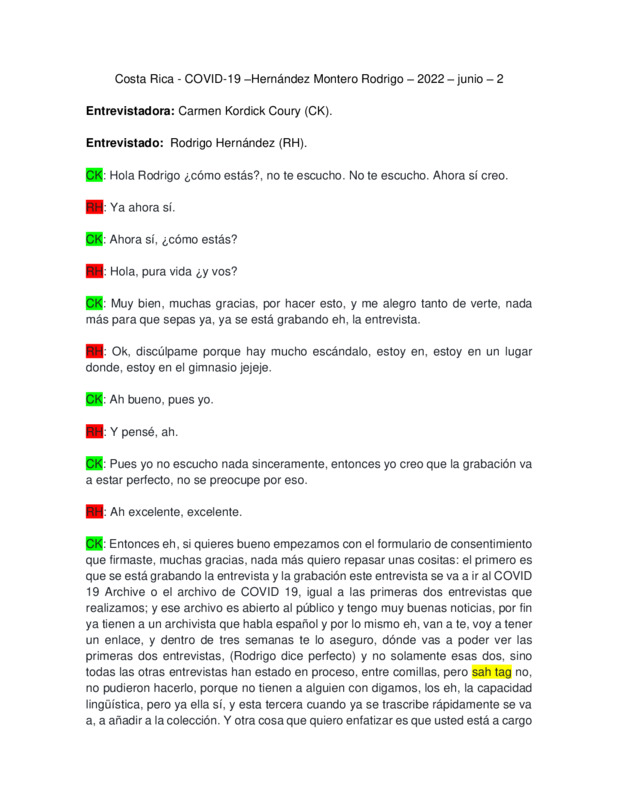 06/02/2022
06/02/2022Rodrigo Hernández Montero Oral History, 2022/06/02
En esta entrevista Rodrigo Hernández Montero es entrevistado por Carmen Kordick Coury concerniente al covid-19 en Costa Rica. Empiezan con que había cambiado desde el ano anterior. Hablan del gobierno, de la vacuna y su experiencia cuando el se vacuno. Habla de sus compañeros que aún no se habían vacunado y de como le fue a su familia cuando se enfermaron del covid. Rodrigo también habla de la caja, describe su trabajo de odontólogo, habla de sus pacientes y del uso de equipo de protección. Habla de sus compañeros del trabajo y su vida social. De la economía, la inflación y la pobreza, De allí, Rodrigo habla de su hogar y familia, del uso de la mascarilla y de las fuentes de información. Para terminar, habla de las elecciones y del futuro. -
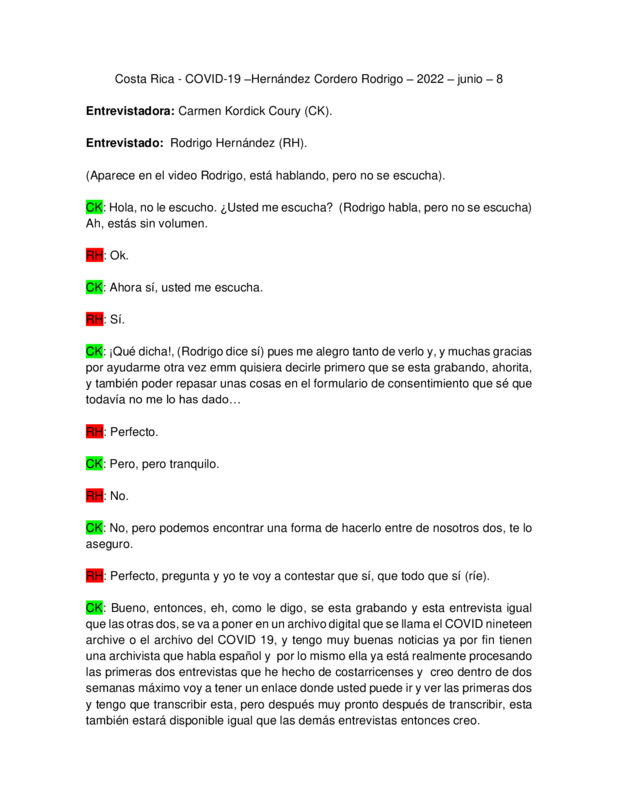 06/08/2022
06/08/2022Rodrigo Hernández Cordero Oral History, 2022/06/08
En esta entrevista Rodrigo Hernández Cordero es entrevistada por Carmen Kordick Coury concerniente al covid-19 en Costa Rica. Para empezar, hablaron de cosas que han cambiado desde el ano anterior. Hablaron de su negocio, inflación, y el gobierno. De allí hablaron del gobierno, la vacuna, y la mascarilla. Hablaron de La Caja, su vida social, y su familia. De las elecciones, fuentes principales de noticias y estudios cerebrales. Para terminar, hablaron de la juventud y de sus pensamientos del futuro. -
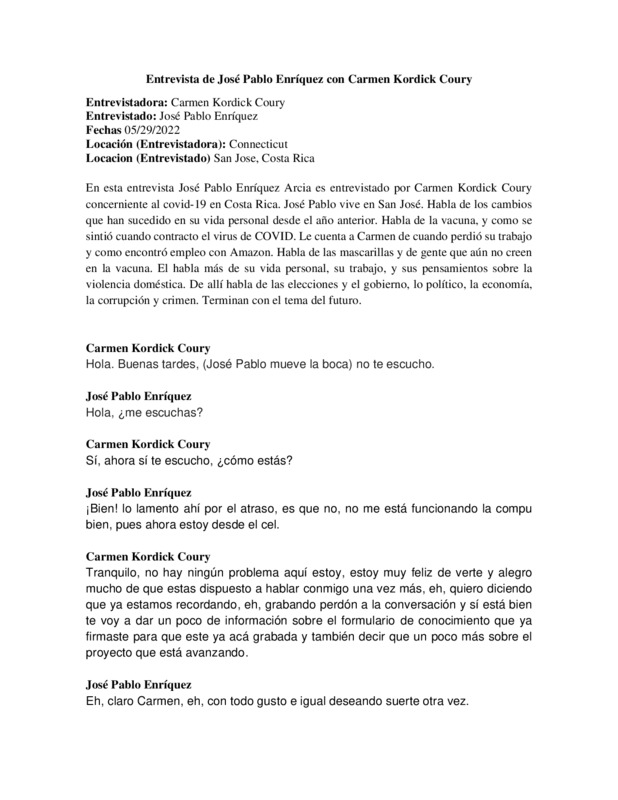 05/29/2022
05/29/2022José Pablo Enriquez Arcia Oral History, 2022/05/29
En esta entrevista José Pablo Enríquez Arcia es entrevistado por Carmen Kordick Coury concerniente al covid-19 en Costa Rica. José Pablo vive en San José. Habla de los cambios que han sucedido en su vida personal desde el año anterior. Habla de la vacuna, y como se sintió cuando contracto el virus de COVID. Le cuenta a Carmen de cuando perdió su trabajo y como encontró empleo con Amazon. Habla de las mascarillas y de gente que aún no creen en la vacuna. El habla más de su vida personal, su trabajo, y sus pensamientos sobre la violencia doméstica. De allí habla de las elecciones y el gobierno, lo político, la economía, la corrupción y crimen. Terminan con el tema del futuro. -
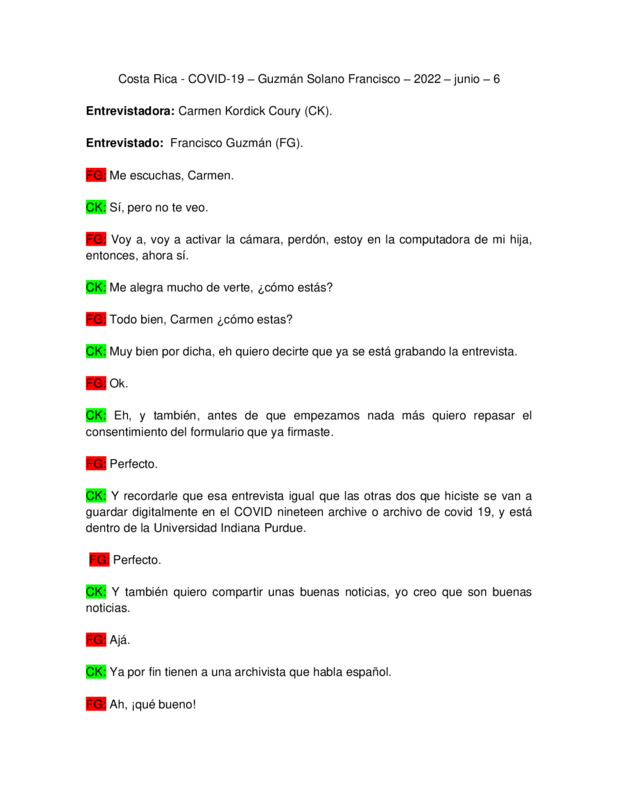 06/06/2022
06/06/2022Francisco Guzman Solano Oral History, 2022/06/06
En esta entrevista Francisco Guzman Solano es entrevistada por Carmen Kordick Coury concerniente al covid-19 en Costa Rica. Empiezan con los cambios que había pasado desde el ano anterior. Francisco habla de su familia y vida social. Hablan del uso de las máscaras, vacunas y la información falsa. De allí, hablan de la economía y la inflación, del gobierno y las elecciones. Hablan del crimen y las drogas. Para terminar, hablan de las fuentes principales de noticias y el futuro. -
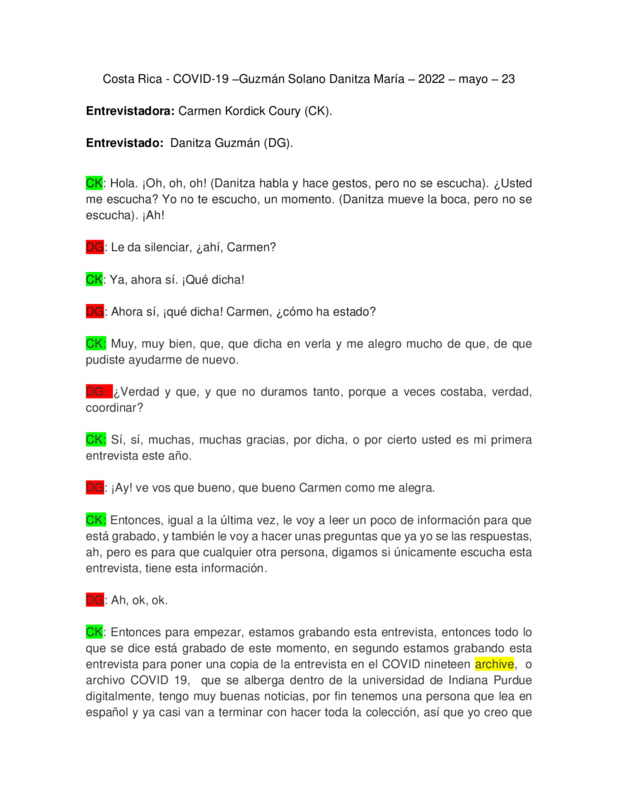 05/23/2022
05/23/2022Danitza Guzman Solano Oral History, 2022/05/23
En esta entrevista Danitza Guzman Solano es entrevistada por Carmen Kordick Coury concerniente al covid-19 en Costa Rica. Hablan de los cambios que han ocurrido desde el año anterior. Hablan del ministerio de educación, de sus estudiantes y de las mascarillas. De la salud mental, el estado mental de sus estudiantes y como van en sus estudios. Danitza también habla de la información falsa y el gobierno. Habla de su familia, su comunidad y su vida social. También hablan de la economía y fuentes de información donde ella recibe sus noticias. Para terminar hablan de las elecciones, lo político, y el futuro. -
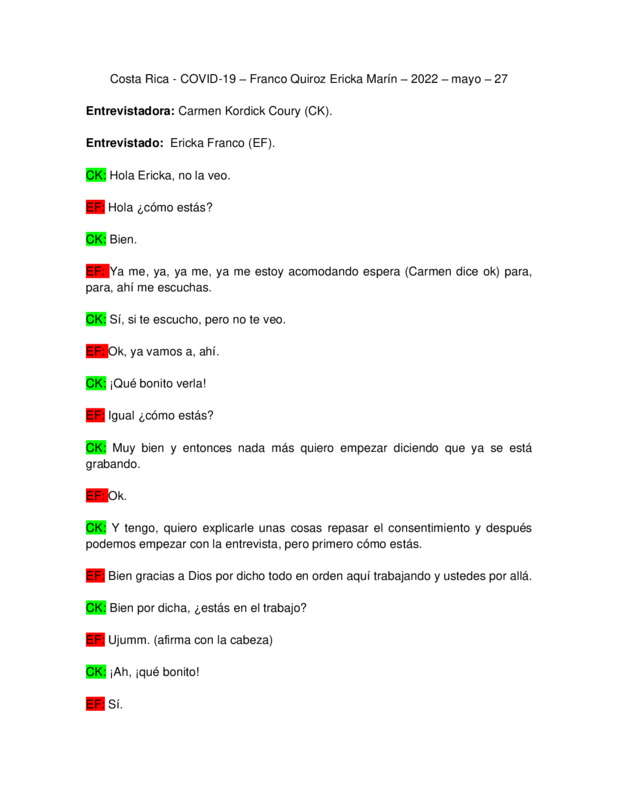 05/27/2022
05/27/2022Erika Franco Quirós Oral History, 2022/05/27
En esta entrevista Erika Franco Quirós es entrevistada por Carmen Kordick Coury concerniente al covid-19 en Costa Rica. Hablan de los cambios que habían pasado desde el año anterior y cuenta que ella empezó ir al trabajo presencialmente tiempo completo. Habla de las vacunas y mascarillas. Erika habla de su trabajo como orientadora para un colegio técnico profesional y también habla de los estudiantes. De allí, ella habla del gobierno, cuenta que ella contracto COVID, y habla de la gente que no se quiere vacunar. Habla de su vida social, fuentes de información donde ella se educa, y la economía. Para terminar, ella habla de las elecciones, salud mental y el futuro. -
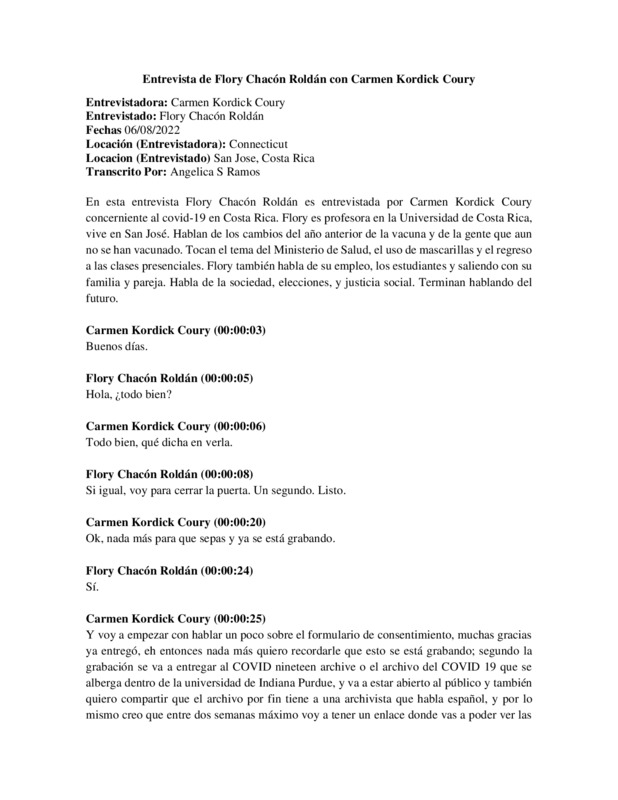 06/08/2022
06/08/2022Flory Chacón Roldán Oral History, 2022/06/08
En esta entrevista Flory Chacón Roldán es entrevistada por Carmen Kordick Coury concerniente al covid-19 en Costa Rica. Flory es profesora en la Universidad de Costa Rica, vive en San José. Hablan de los cambios del año anterior de la vacuna y de la gente que aun no se han vacunado. Tocan el tema del Ministerio de Salud, el uso de mascarillas y el regreso a las clases presenciales. Flory también habla de su empleo, los estudiantes y saliendo con su familia y pareja. Habla de la sociedad, elecciones, y justicia social. Terminan hablando del futuro. -
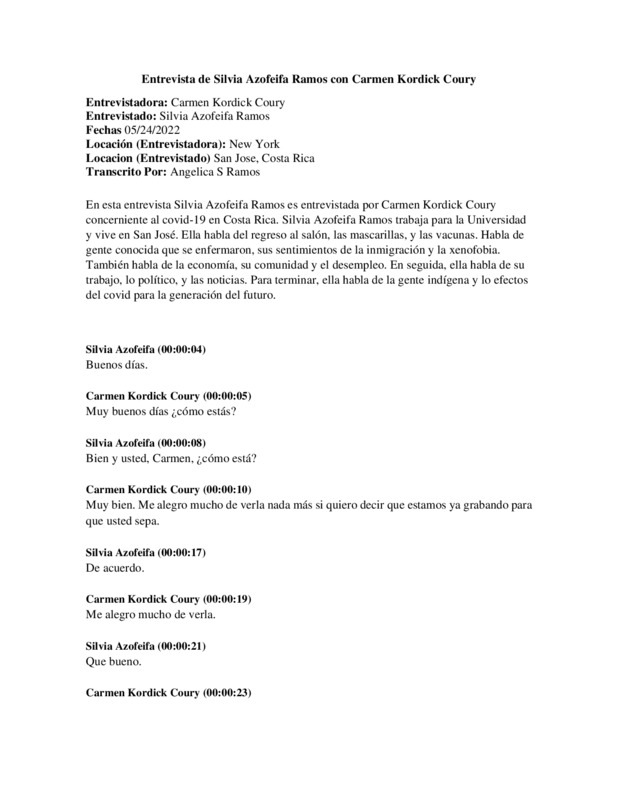 05/24/2022
05/24/2022Silvia Azofeifa Ramos Oral History, 2022/05/24
En esta entrevista Silvia Azofeifa Ramos es entrevistada por Carmen Kordick Coury concerniente al covid-19 en Costa Rica. Silvia Azofeifa Ramos trabaja para la Universidad y vive en San José. Ella habla del regreso al salón, las mascarillas, y las vacunas. Habla de gente conocida que se enfermaron, sus sentimientos de la inmigración y la xenofobia. También habla de la economía, su comunidad y el desempleo. En seguida, ella habla de su trabajo, lo político, y las noticias. Para terminar, ella habla de la gente indígena y lo efectos del covid para la generación del futuro. -
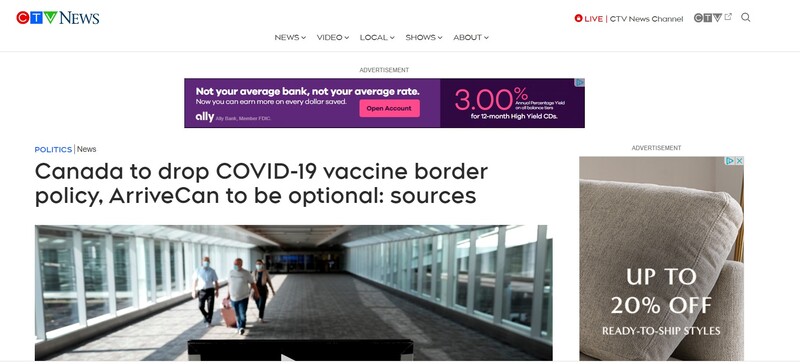 2022-09-21
2022-09-21ArriveCan application and Canada's COVID-19 vaccine border requirements
This news article reports Canada's plan to drop its COVID-19 vaccine border requirements, make the ArriveCan application optional, and possibly end COVID-19 testing for travelers by the end of September 2022. This news shows how the COVID-19 pandemic impacted travel and border relations between countries (Canada and US). -
2022-08-30
HERMIT HERALD, ISSUE 145
Political divisions greatest threat to U.S.; 7 Billion weapons left in Afghanistan; Opioid $ penalties; $300 billion college loan forgiveness; college tuition up 6x inflation; 16% of voters would not have voted for Biden; election not stolen at voting booth; Democrats gaining fast on midterm elections; Trump welcomes embrace of QAnoners -
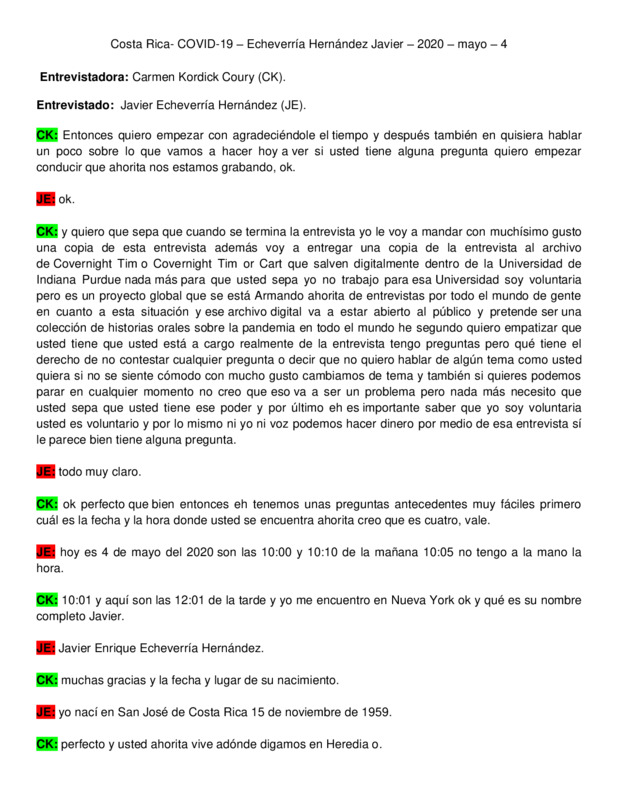 05/04/2020
05/04/2020Javier Echeverria Hernández Oral History, 2020/05/04
En esta entrevista Javier Hernández Echeverria es entrevistado por Carmen Kordick Coury concerniente al covid-19 en Costa Rica. Para empezar, hablan de la primera ves que Javier se dio cuenta de la pandemia, de cómo se sintió y sus preocupaciones. Habla de su hogar y las formas en que su vida ha cambiado, también habla de su trabajo de ingeniero agrónomo. De allí, hablan de la economía, de su familia y comunidad. Hablan del gobierno, cambios en su barrio y el uso de las mascarillas. También hablan de gente conocida que se han enfermado, gente que aun viajan y las fronteras cerradas. Para terminar, hablan de las fuentes principales desinformación, corrupción del gobierno y cambios en como ve su familia sus amigos y su comunidad. -
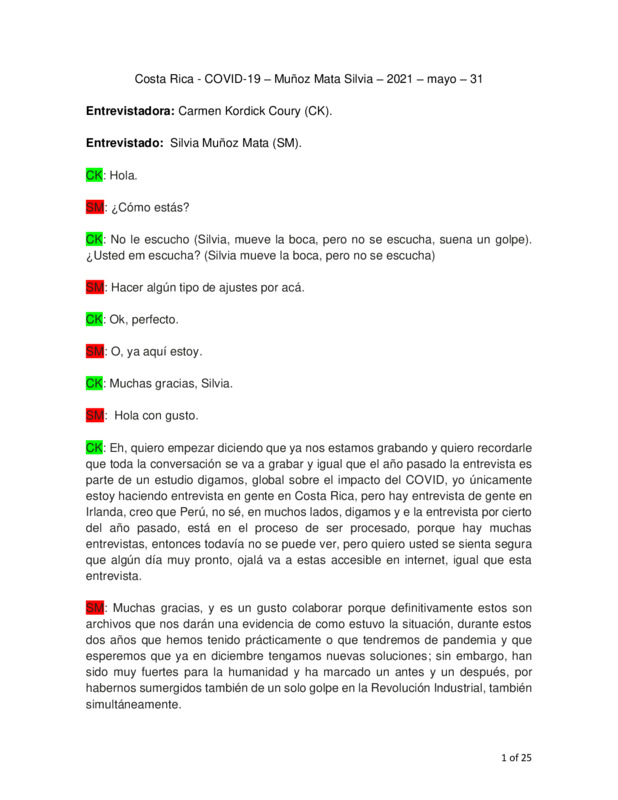 05/31/2021
05/31/2021Silvia Muñoz Mata Oral History, 2021/05/31
En esta entrevista Silvia Muñoz Mata es entrevistada por Carmen Kordick Coury concerniente al covid-19 en Costa Rica. Empiezan hablando de los cambios que habían ocurrido desde el ano anterior. Hablan del trabajo y el trabajo virtual. De la violencia domestica y otros problemas que existen en la sociedad. De allí hablan del crimen, violencia y las divisiones económicas que existen alrededor de ella. Hablan de las vacunas, gente conocida que no se quiere vacunarse y las teorías conspiratorias que existen sobre las vacunas. De allí hablan del gobierno, familia y salud física y mental. Para terminar hablan de narcotraficantes y del futuro. -
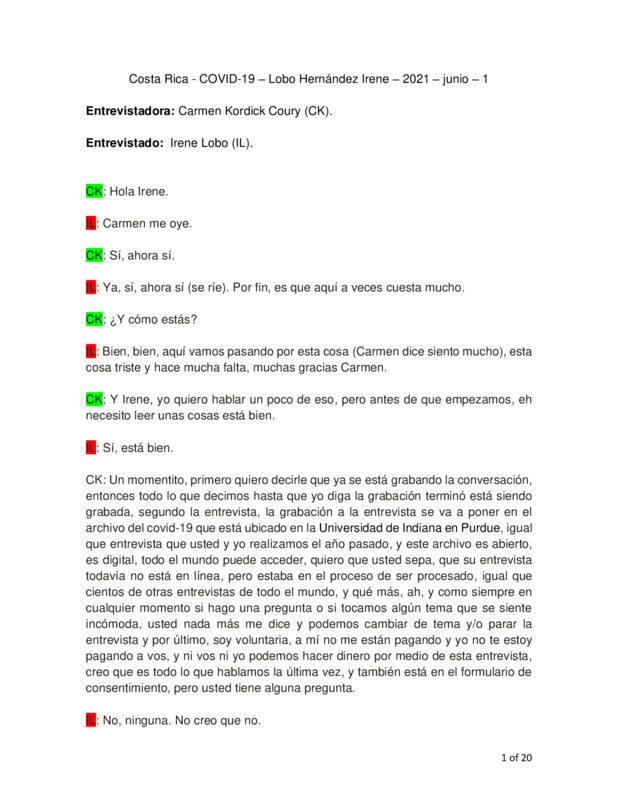 06/01/2021
06/01/2021Irene Lobo Hernández Oral History, 2021/06/01
En esta entrevista Irene Lobo Hernández es entrevistada por Carmen Kordick Coury concerniente al covid-19 en Costa Rica. Habla de los cambios desde el año anterior. También hablan del gobierno, de la vacuna y de la gente que no se quiere vacunar. Hablan de las aulas virtuales y del uso de mascarillas. De allí, Irene habla de su hermana Eugenia que falleció de complicaciones de covid. Irene también habla de la caja, del ministerio de salud, el presidente y la asamblea. Hablan de la frontera de Nicaragua y la economía. Para terminar, hablan de su familia y el futuro. -
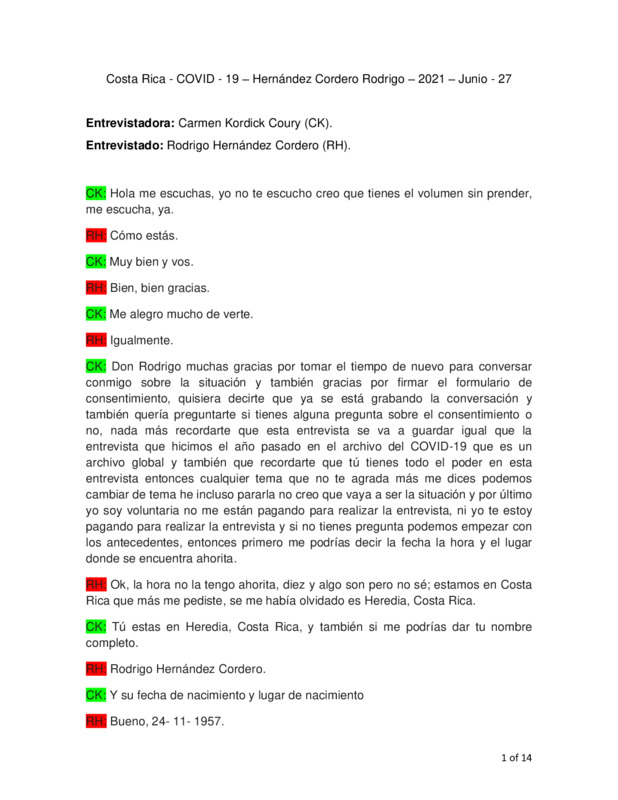 06/27/2021
06/27/2021Rodrigo Hernández Cordero Oral History, 2021/06/27
En esta entrevista Rodrigo Hernández Cordero es entrevistado por Carmen Kordick Coury concerniente al covid-19 en Costa Rica. Para empezar, hablaron de los cambios que pasaron desde el ano anterior. Rodrigo es dueño de tienda, hablan de su negocio, de las vacunas y de su deseo de no vacunarse. Hablan del gobierno, del uso de mascarillas y su familia. De allí, hablan de La Caja, el sistema médico y hospitales privados. Rodrigo habla de cruzando fronteras y comparando para su tienda. También de la corrupción del gobierno, vida familiar, salud mental y de los funerales. Para terminar, hablan de la esperanza para el futuro, fuentes principales de noticias y noticias falsas. -
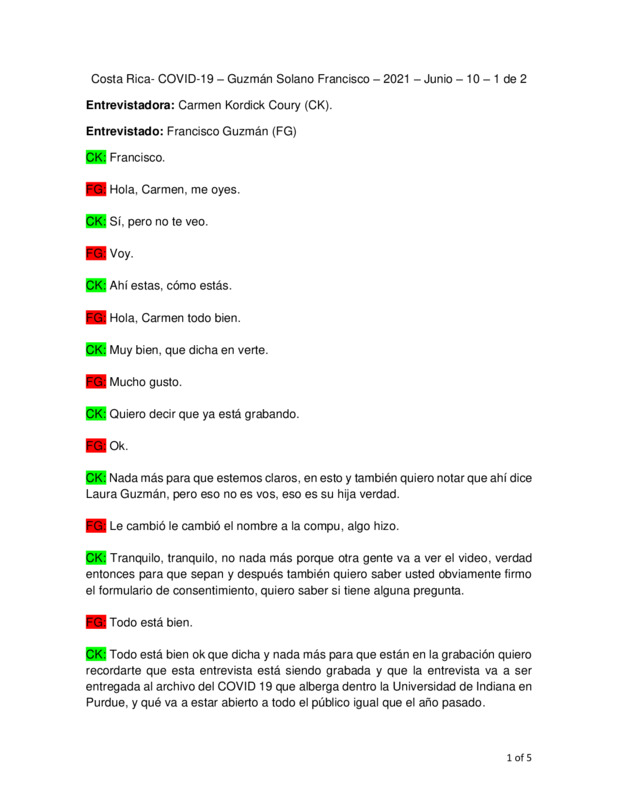 06/10/2021
06/10/2021Francisco Guzman Solano Oral History, 2021/06/21
En esta entrevista Francisco Guzman Solano es entrevistado por Carmen Kordick Coury concerniente al covid-19 en Costa Rica. Empiezan hablar de los cambios que Francisco ha visto desde el ano anterior. Hablan de la economía y el gobierno, de su trabajo y la vacuna. También hablan del aumento del crimen, de las drogas, y de las noticias falsas. De la Caja y el ministro de Salud. Francisco también habla de su familia y su hogar, de las fuentes principales de información y la sociedad. Terminan hablando de las clases virtuales de su hija, de la educación y del Ministerio de Educación. -
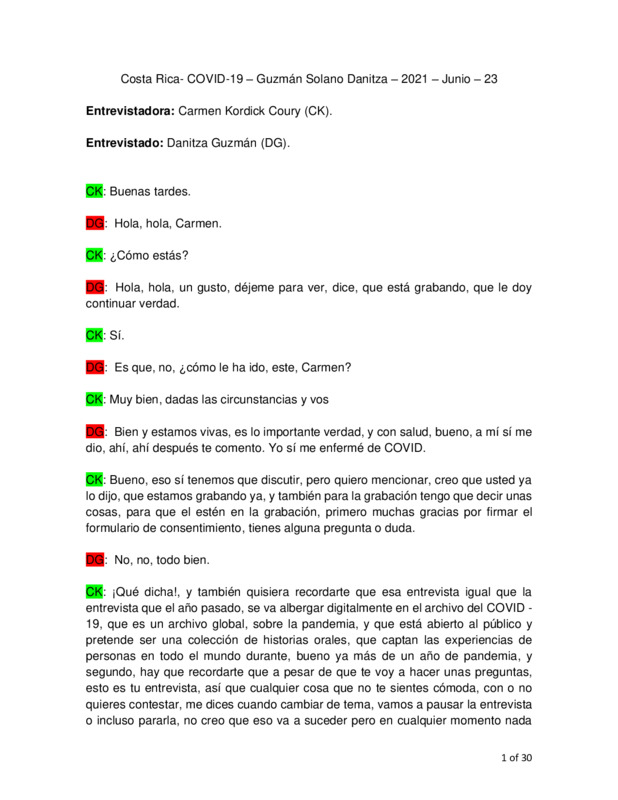 06/23/2021
06/23/2021Danitza Guzman Solano Oral History, 2021/06/23
En esta entrevista Danitza Guzman Solano es entrevistada por Carmen Kordick Coury concerniente al covid-19 en Costa Rica. Hablan de los cambios que han ocurrido desde el ano anterior. De su trabajo como docente, los cambios que han ocurrido y sus estudiantes. Hablan del ministerio de educación, ministerio de salud y de las vacunas. También hablan de gente que no se quieren vacunar y cuenta de cuando se enfermo con el coronavirus. Danitza habla de gente conocida que se enfermaron y algunos que murieron de la enfermedad. Para terminar, hablan del gobierno, del futuro, de la salud mental y de las elecciones. -
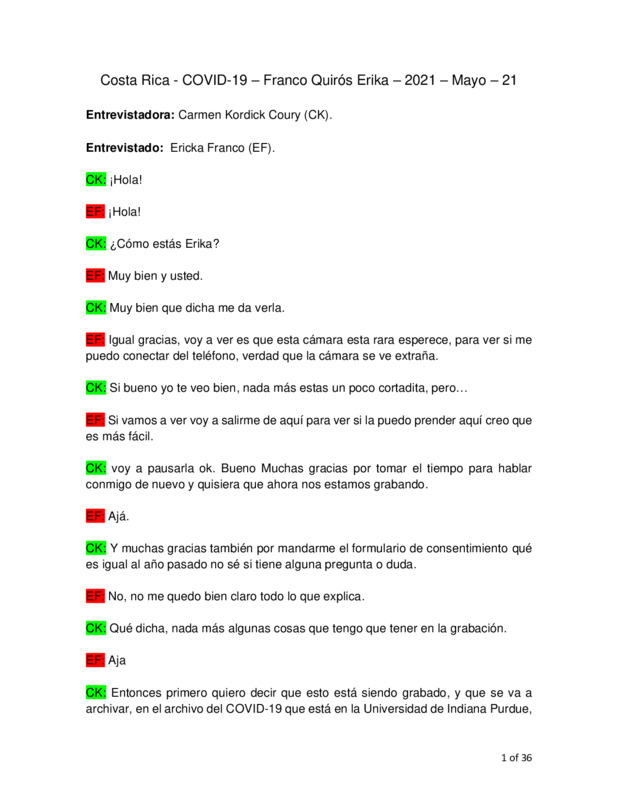 05/21/2021
05/21/2021Erika Franco Quirós Oral History, 2021/05/21
En esta entrevista Erika Franco Quirós es entrevistada por Carmen Kordick Coury concerniente al covid-19 en Costa Rica. Habla del regreso al trabajo presencial y los protocolos que tiene que seguir en el trabajo. Habla de las vacunas, del gobierno y de las personas que viajan para vacunarse. También habla de los cambios que ha visto en la sociedad, de la gente que son contra la vacuna, su familia y vida personal. Erika también habla del uso de la máscara y del ministro de salud. Para terminar, ella habla de las fuentes principales de noticias que usa, de las noticias falsas y de el futuro. -
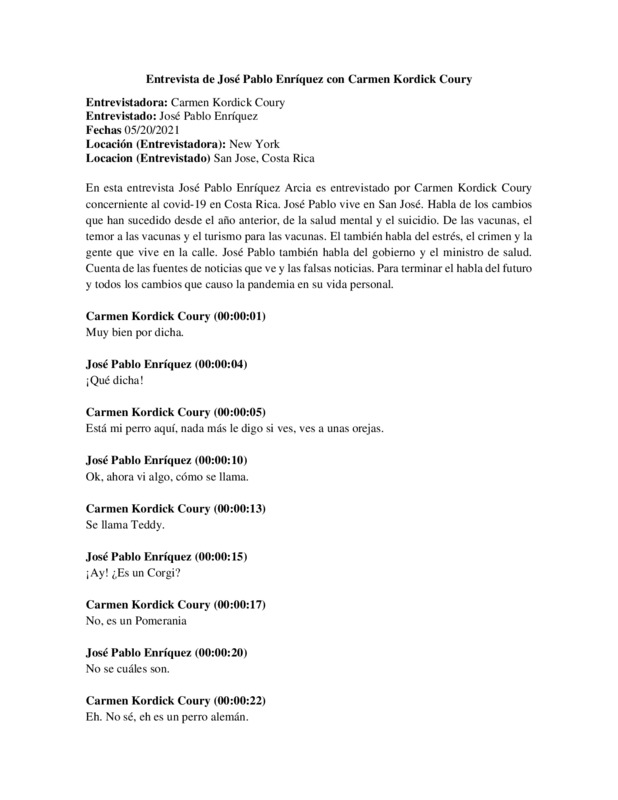 05/20/2021
05/20/2021José Pablo Enriquez Arcia Oral History, 2021/05/20
En esta entrevista José Pablo Enríquez Arcia es entrevistado por Carmen Kordick Coury concerniente al covid-19 en Costa Rica. José Pablo vive en San José. Habla de los cambios que han sucedido desde el año anterior, de la salud mental y el suicidio. De las vacunas, el temor a las vacunas y el turismo para las vacunas. El también habla del estrés, el crimen y la gente que vive en la calle. José Pablo también habla del gobierno y el ministro de salud. Cuenta de las fuentes de noticias que ve y las falsas noticias. Para terminar el habla del futuro y todos los cambios que causo la pandemia en su vida personal. -
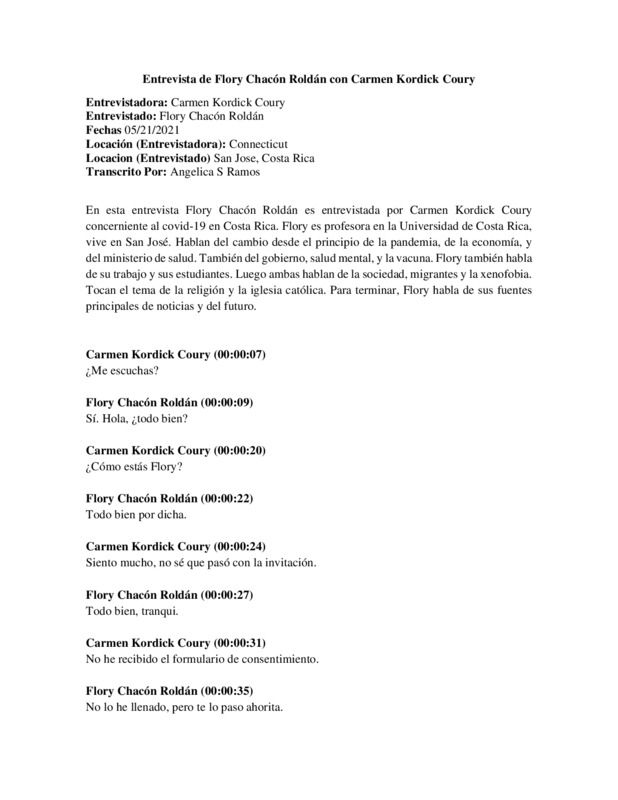 05/21/2021
05/21/2021Flory Chacón Roldán Oral History, 2021/05/21
En esta entrevista Flory Chacón Roldán es entrevistada por Carmen Kordick Coury concerniente al covid-19 en Costa Rica. Flory es profesora en la Universidad de Costa Rica, vive en San José. Hablan del cambio desde el principio de la pandemia, de la economía, y del ministerio de salud. También del gobierno, salud mental, y la vacuna. Flory también habla de su trabajo y sus estudiantes. Luego ambas hablan de la sociedad, migrantes y la xenofobia. Tocan el tema de la religión y la iglesia católica. Para terminar, Flory habla de sus fuentes principales de noticias y del futuro. -
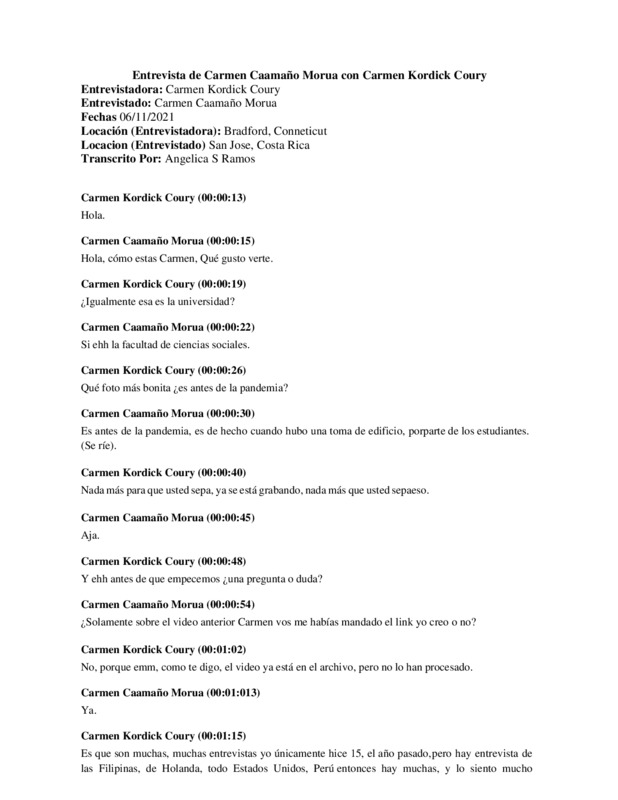 06/11/2021
06/11/2021Carmen Caamaño Morua Oral History, 2021/06/11
En esta entrevista Carmen Caamaño Morua es entrevistado por Carmen Kordick Coury concerniente al covid-19 en Costa Rica. Carmen es profesora en la Universidad de Costa Rica y vive en San José. Habla de su trabajo virtual en la universidad, del crisis de la salud mental y de la gente que cree en las teorías de la conspiración. Carmen habla de la relación entra las ciencias y la religión y como eso afecta los sentimientos hacia la vacuna. Habla de la xenofobia, el racismo y el clasismo. También habla de las vacunas y la respuesta del gobierno. Para terminar, Carmen habla del gobierno, la economía y las noticias. -
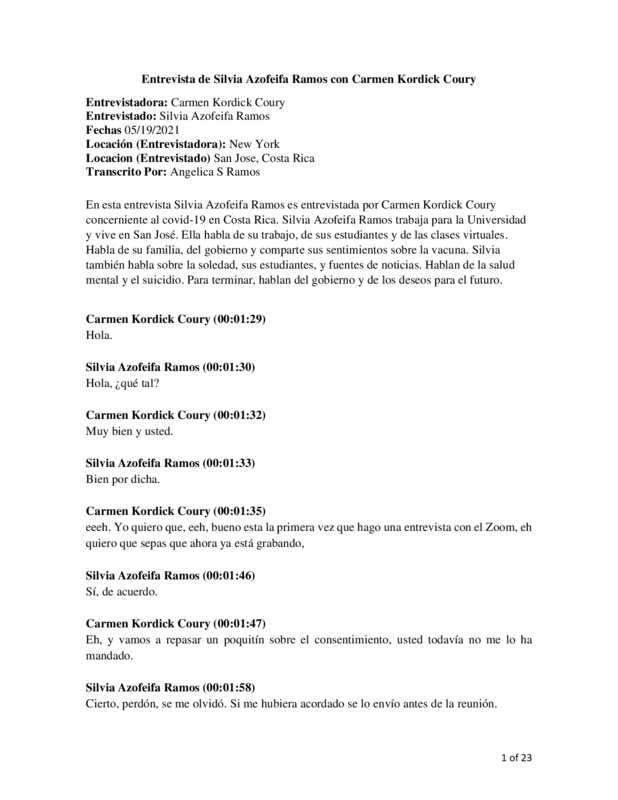 05/19/2021
05/19/2021Silvia Azofeifa Ramos Oral History, 2021/05/19
En esta entrevista Silvia Azofeifa Ramos es entrevistada por Carmen Kordick Coury concerniente al covid-19 en Costa Rica. Silvia Azofeifa Ramos trabaja para la Universidad y vive en San José. Ella habla de su trabajo, de sus estudiantes y de las clases virtuales. Habla de su familia, del gobierno y comparte sus sentimientos sobre la vacuna. Silvia también habla sobre la soledad, sus estudiantes, y fuentes de noticias. Hablan de la salud mental y el suicidio. Para terminar, hablan del gobierno y de los deseos para el futuro. -
 2022-07-20
2022-07-20Hermit HERALD, ISSUE 143
Biden/Trump 2024? -
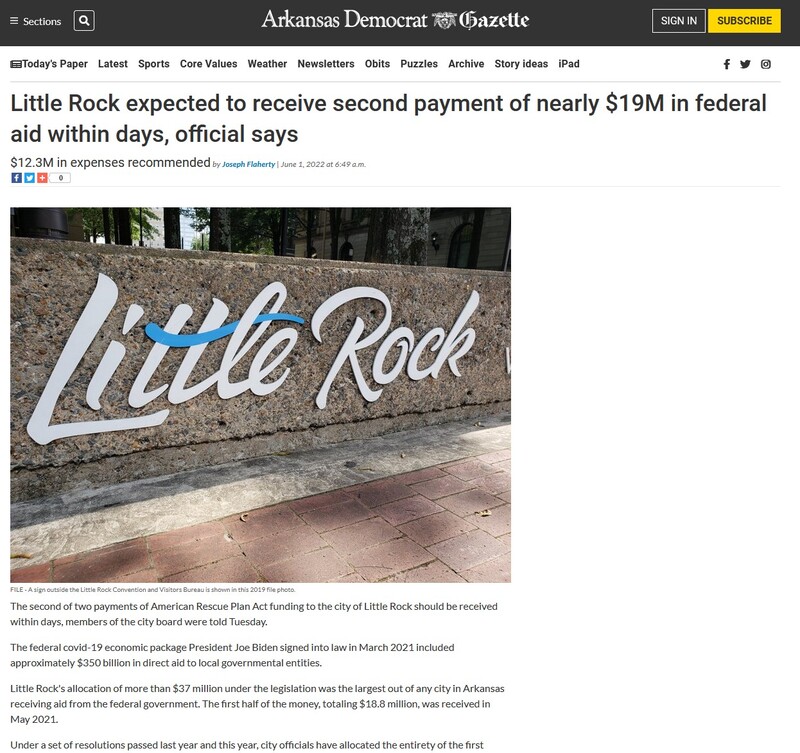 2022-06-01
2022-06-01Little Rock and Relief
This article details the $19 million dollars in aid Arkansas' capital received from the federal government. As part of the American Rescue Plan, many larger cities are receiving direct aid from the federal government and Little Rock previously received $18.8 million in May of 2021. The city has decided to allocate much of the funds to improving public works, renovations, and policing. It is interesting to see just how excessively covid impacted cities and the extreme necessity of federal aid. It is particularly beneficial when state legislatures have failed to provide money for needed refurbishment. However, payouts such as this begs the question: who will pay? -
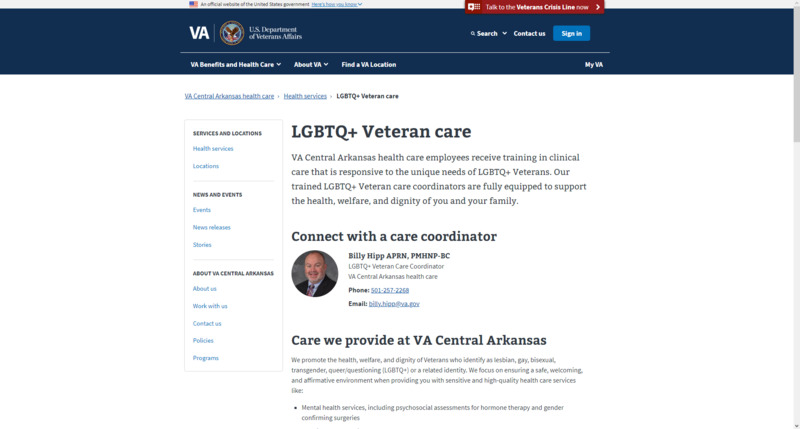 2022-07-11
2022-07-11LGBTQ+ VA Healthcare in Arkansas in the wake of COVID
This is the Arkansas Veterans Affairs website listing specific resources for LGBTQ+ veterans in Arkansas. This site places a specific emphasis on Central Arkansas due to the heavy LGBTQ+ population in that area. In order to combat COVID-19, this site focuses on not only concerted vaccine rollout for LGBTQ+ vets, but also lists mental health resources in order to combat COVID-19. I think this shows a particular vulnerability to a select group and how COVID-19 can reach anyone. Indeed, it is essential that at-risk groups such as the LGBTQ+ community are not overlooked in the age of COVID, and it is encouraging to see the VA take steps to assure this is the case. -
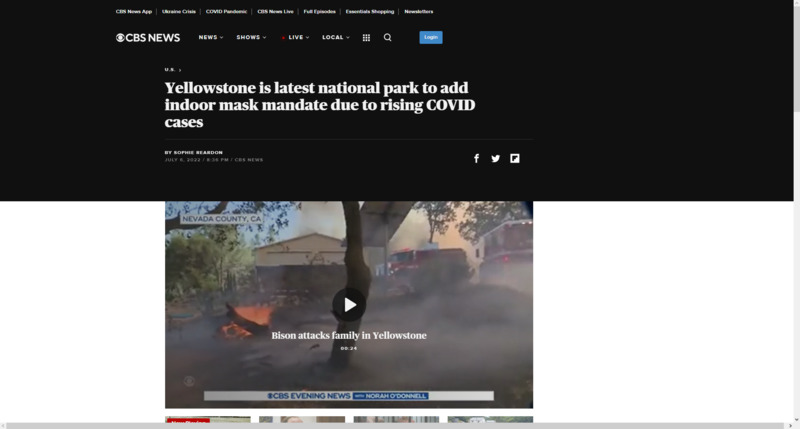 2022-07-06
2022-07-06U.S. Yellowstone is latest national park to add indoor mask mandate due to rising COVID cases
This is a news story from CBS News from Sophie Reardon. Due to rising cases, Yellowstone National Park will now require visitors two years and older to wear masks indoors. Other national parks have mask mandates too, such as the Grand Canyon, Yosemite, and the Grand Tetons. This requirement is for everyone using an indoor facility, regardless of vaccination status. For future visitors at this time to these parks, it is recommended one look up COVID requirements for the place they wish to go. -
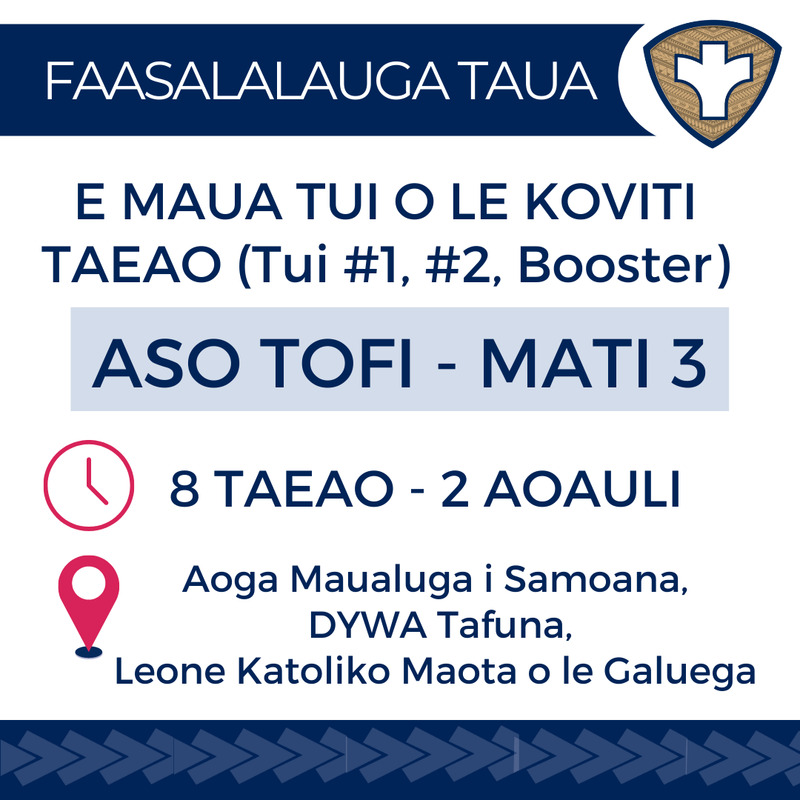 2022-03
2022-03COVID Vaccine Drive Thru Flyers
These are some of the many flyers by the American Samoa Department of Health for the people of American Samoa on information about the where, when, how, what, and why of COVID 19 vaccinations and tests on the island. -
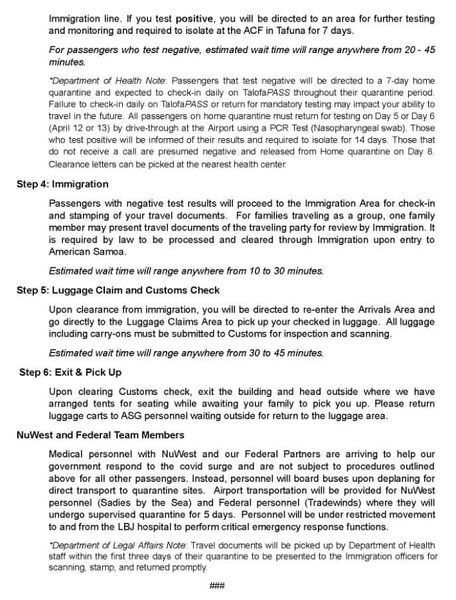 2022-04-07
2022-04-07Arrival Requirement at Pago Pago International Airport for April 7 Hawaiian Air Flight
The Governor and Lt. Governor of American Samoa has issued arrival requirements for travelers on the April 7th Hawaiian Air Flight coming into the island. These requirements are to ensure the safety of the people of American Samoa and as well as the travelers traveling to American Samoa from COVID-19. -
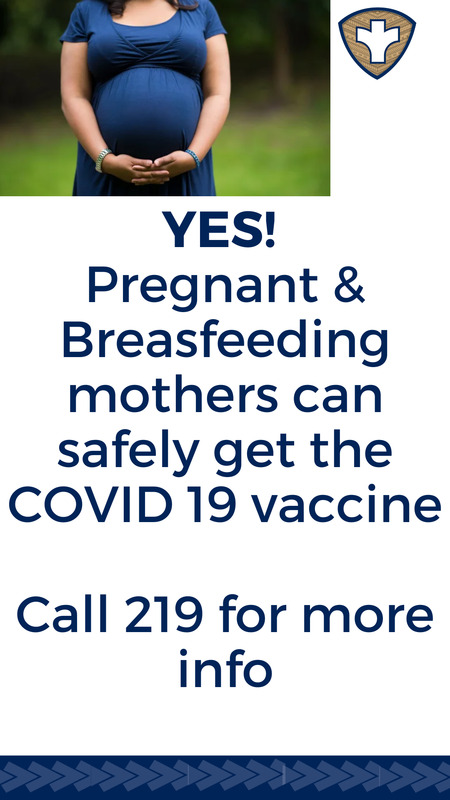 2022-04
2022-04Pregnant Mothers Can Get Safely Vaccinated
The American Samoa Department of Health released this flyer for pregnant women that can get vaccinated safely. This is a piece of great information for the public, especially for pregnant women who are wondering if they can get the vaccine. -
 2022-06-21
2022-06-21HERMIT HERALD, ISSUE 142
We perceive what we want to perceive -
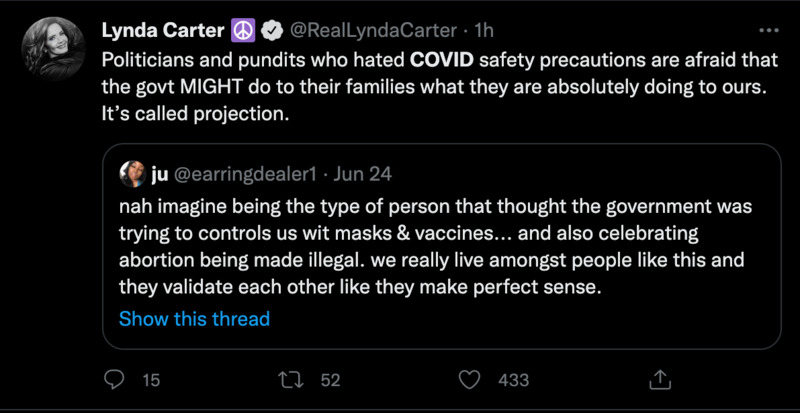 2022-06-25
2022-06-25It's called projection
This is a tweet from RealLyndaCarter. Lynda Carter is famous for her role in the Wonder Woman TV series. Here, she is expressing anger at those who hated COVID safety precautions wanting to control what people do with their health on abortion. -
 2022-06-25
2022-06-25Learn how the government works
This is a tweet by StabbyandSpicy. This person is expressing their frustrations over their mom getting COVID, and the Supreme Court decision on Roe v. Wade being overturned. -
 2022-05-03
2022-05-03COVID protocol and abortion
This is a tweet from CJ_isnowblue regarding the leaked opinion from the Supreme Court on abortion. She is criticizing the way Republicans have protested for their rights to bodily autonomy on things such as mask mandates and vaccines, while wanting to restrict the bodily rights women have. Throughout the pandemic, the abortion debate has come up a time or two due to the "my body, my choice" rhetoric being used by those against masks and vaccines. Prior to this, it was mainly used for discussions on abortion, but now the two subjects are getting linked in public discourse. -
 2022-05-02
2022-05-02You can't co-opt "my body, my choice"
This is a tweet from Anna Akana regarding the leaked opinion draft from the Supreme Court, which would overturn Roe v. Wade. Here, she is criticizing people who use "my body, my choice" in regards to masks, but don't allow it for when it comes to women's reproductive health. -
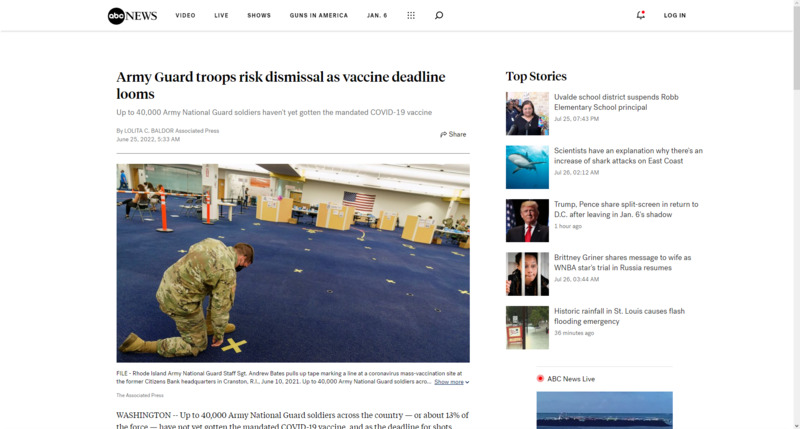 2022-06-25
2022-06-25Army Guard troops risk dismissal as vaccine deadline looms
This is a news story from ABC news by Lolita C. Baldor. Up to 40,000 National Guard soldiers, which consists of roughly 13% of the force, have not yet received the mandated COVID vaccine. Soldiers have until Thursday to get the vaccine. Out of all military branches, the National Guard was given the largest window to fulfill that requirement. -
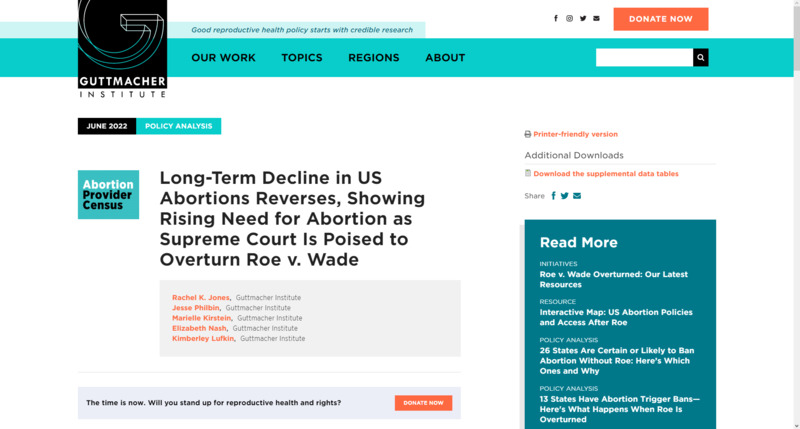 2022-06-15
2022-06-15Long-Term Decline in US Abortions Reverses, Showing Rising Need for Abortion as Supreme Court Is Poised to Overturn Roe v. Wade
This is a news story from The Guttmacher Institute. This article was written before the official Supreme Court decision was released on abortion. The article states that the 30 year decline in abortions has picked up with the threat of Roe v. Wade getting overturned. At the time this article is being entered in, Roe has been officially overturned by the Supreme Court. What is more interesting to me are the numbers given on abortions in 2020, when COVID was at its peak. In 2020, there was 930,160 total abortions, which was an 8% increase from 862,320 abortions in 2017. In 2020, about 1 in 5 pregnancies ended in abortion. The increase in abortions was marked in an overall 6% decrease in births between 2017 and 2020. The article does not discuss the social reasons why more abortions were happening in 2020 compared to other years, but in my own opinion, people's fears of hospitals being too full and the financial strain of lockdowns would have made it difficult to want to carry a baby to term. At the time, people were unsure of how long lockdowns and restrictions would last, so getting the pregnancy care needed to prevent issues giving birth would have been harder to come by. -
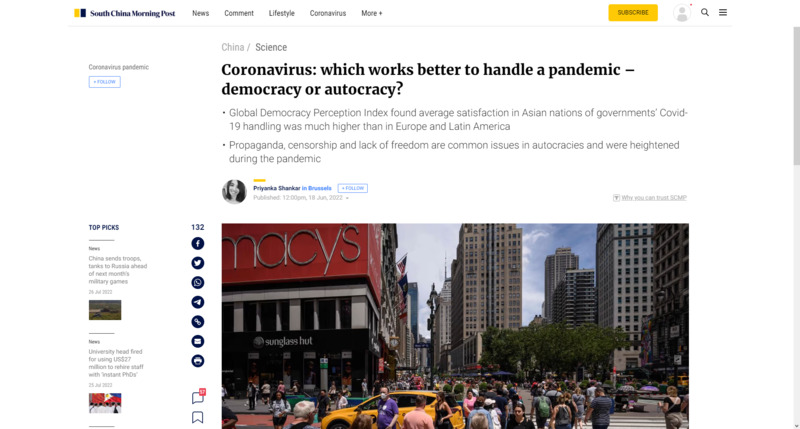 2022-06-18
2022-06-18Coronavirus: which works better to handle a pandemic – democracy or autocracy?
This is a news story from the South China Morning Post by Priyanka Shankar. This article is discussing the difference in responses based on forms of government. When it came to handling the pandemic, people from Asian countries where restrictions were much tougher rated a higher rate of satisfaction in government response compared to Latin America and Europe. This was taken from the Democracy Perception Index. According to researcher Fredrick DeVeaux, a leader in conducting this survey, the tight restrictions common in Asian countries are generally accepted because it gets associated with low death rates. The survey does make mention that in countries such as Iran and China, they hid data about the virus from their citizens, affecting their overall response to changes in lockdowns. However, Singapore is also authoritarian, and the prime minister has made an effort to create transparency in what is occurring, so items get hoarded less. Overall, the article claims that the mass mobilization of people and goods under authoritarian regimes fares better than democracies do at creating an effective COVID response. -
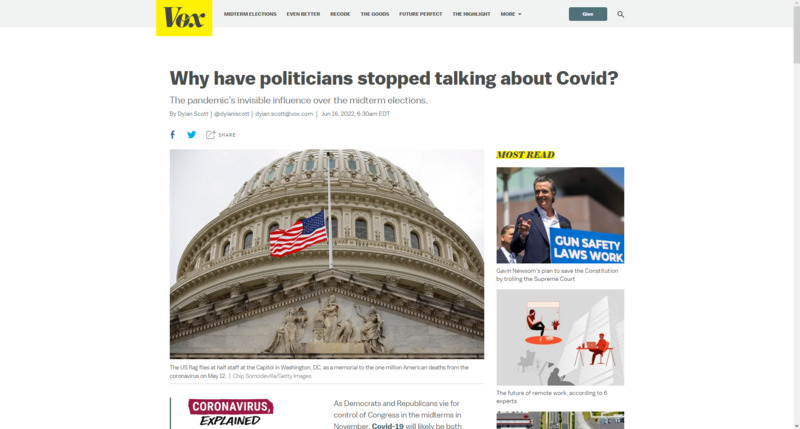 2022-06-16
2022-06-16Why have politicians stopped talking about Covid?
This is a text story from Vox by Dylan Scott. The article claims that COVID helped sink President Donald Trump's re-election campaign, yet despite this, it is not being focused on by either party. Though, this author believes the Democrat response hasn't been much better, with people not really touting President Joe Biden's vaccine rollout and other initiatives. The author links the reason for inflation being COVID interrupting supply lines, which is on people's minds for this midterm election. According to Gallup polling, COVID has lost importance in many people's minds, with it falling behind Russia and gas prices. On the Republican side of things, COVID is rarely mentioned, and if it is, it is in a negative light. Scott says that candidates favored by Donald Trump have gone against his ideas, with them being more skeptical of vaccines, and some refusing to get the vaccine at all. COVID is being tied to an anti-establishment attitude that has been rising within the Republican party. As for my own opinion on this piece, I believe that is does bring up an interesting point with linking COVID to current inflation. I do agree that COVID has impacted the economy for the worst with supply chains being more limited and rising spending of the federal government to counter it, but I do not think it can explain everything. Federal spending in general has been on an increase, which is driving up the cost of items, and not all that spending is COVID related. In addition to that, the shutdown of important pipelines has made reliance on foreign oil more of a necessity, which then drives up gas prices. These types of decisions can't all be traced back to COVID. So while I do think COVID has impacted the economy, I do not think it explains nearly all the economic issues the United States is facing. -
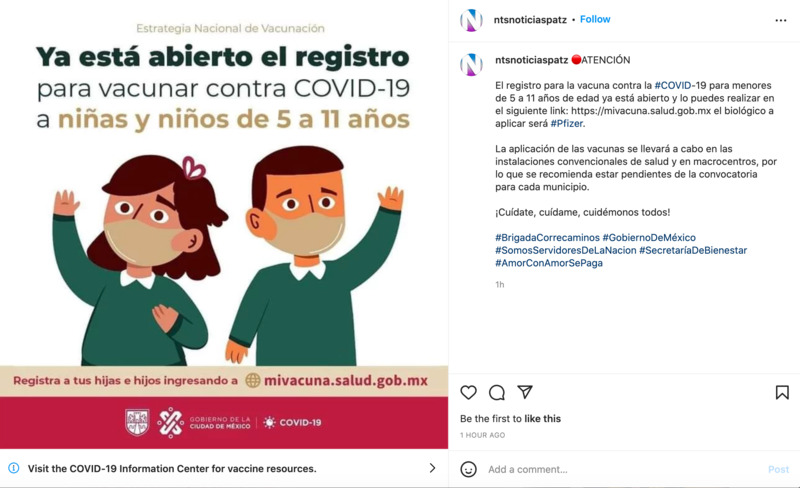 2022-06-17
2022-06-17Vaccines for kids 5-11
This is an Instagram post by ntsnoticiaspatz. It is saying that if you have not, you should register your kid to receive their vaccine. This is being promoted by the Mexican government.
